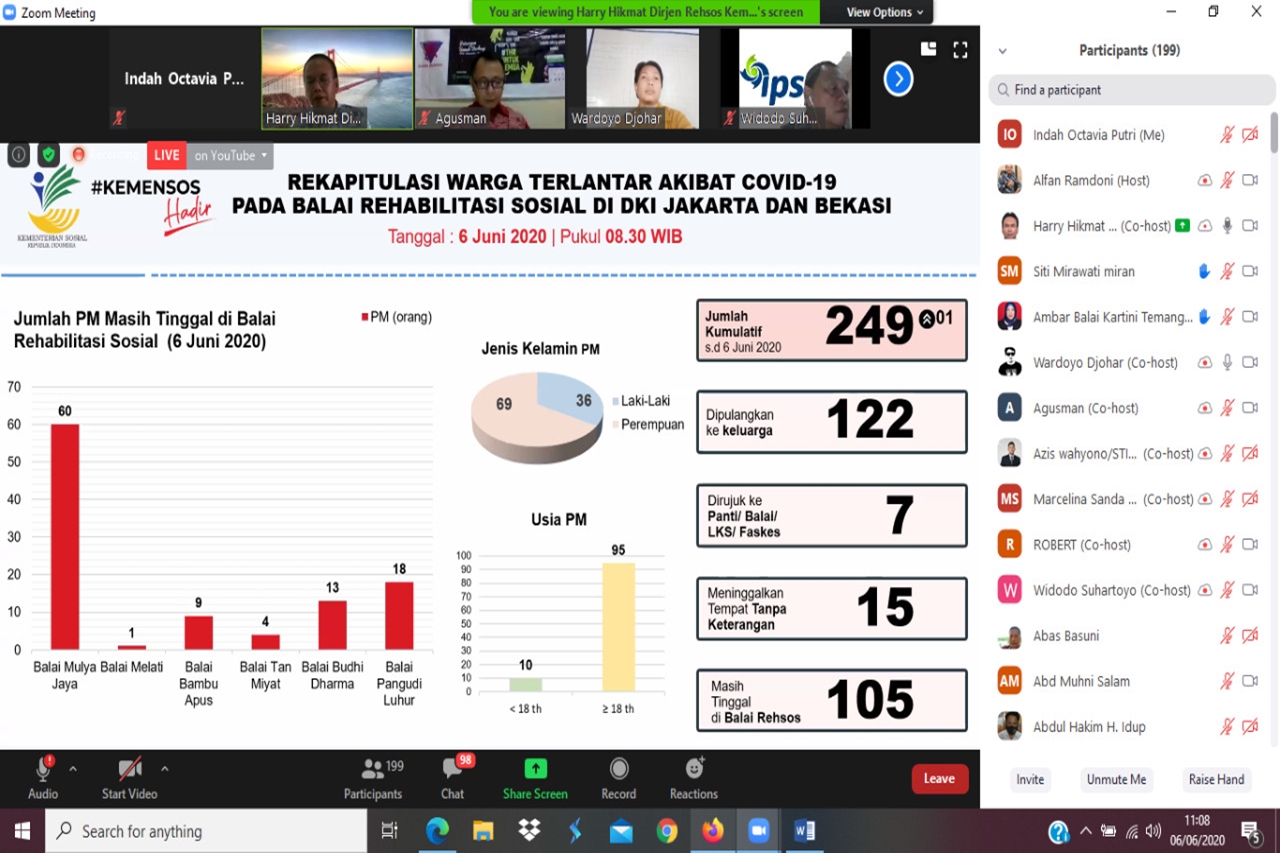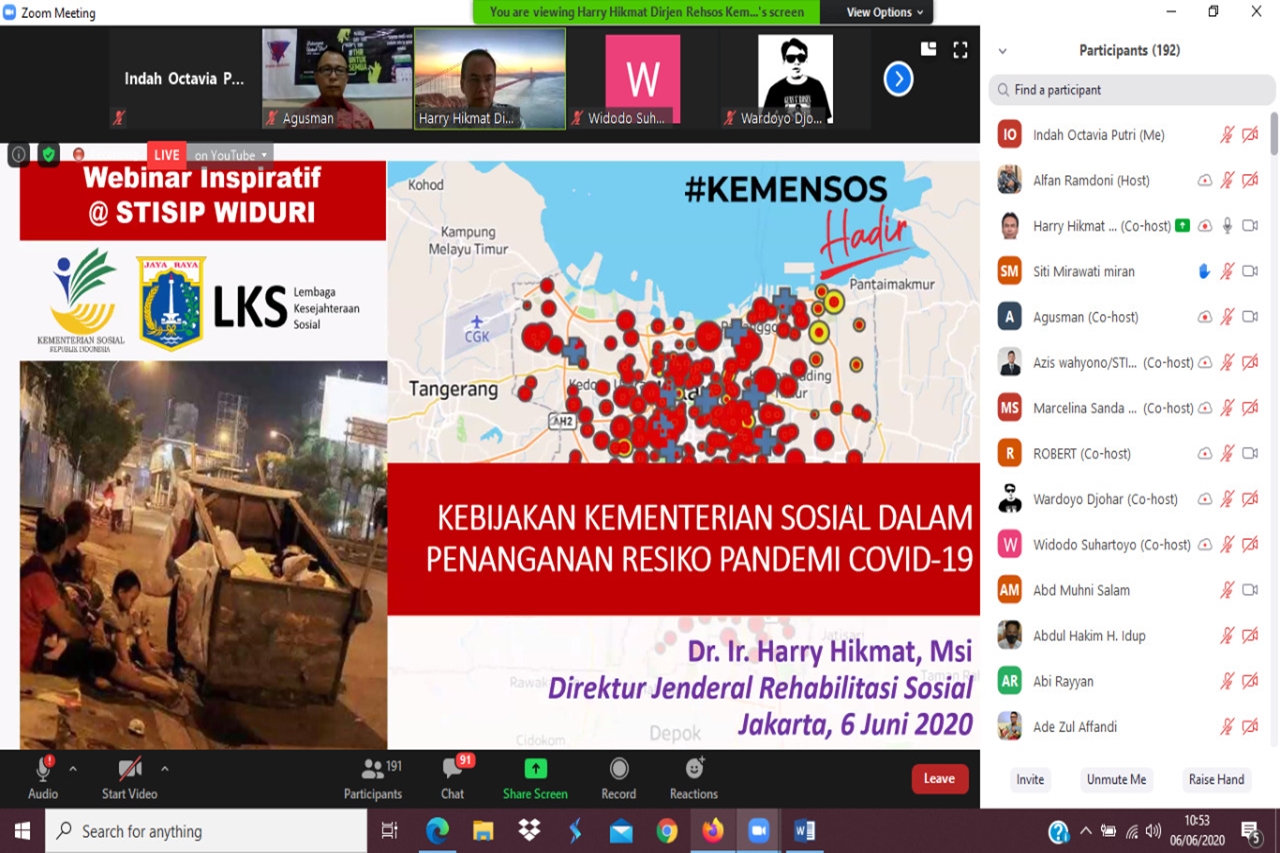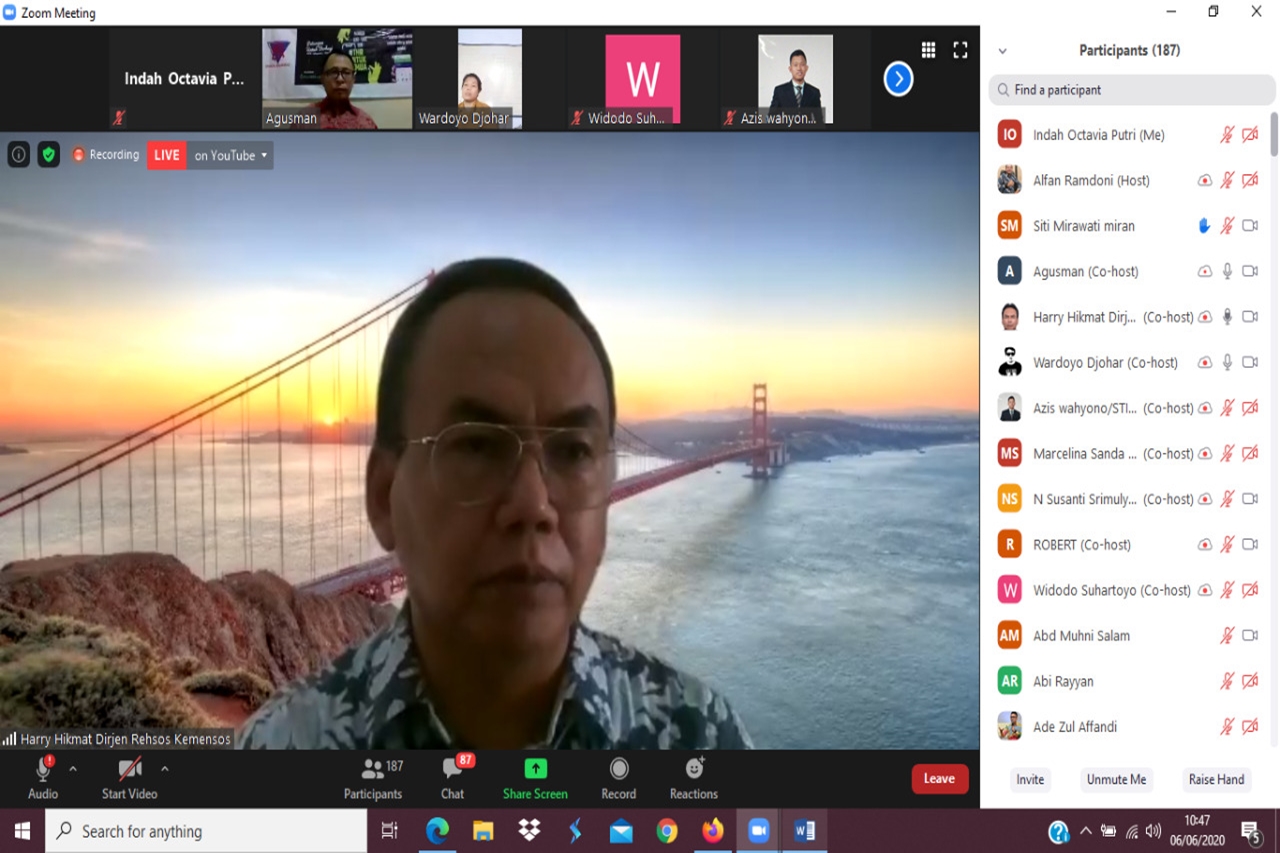JAKARTA (June 6, 2020) - The Ministry of Social Affairs through the
Directorate General of Social Rehabilitation has gained valuable experience in
handling neglected people due to COVID-19. This experience was shared by the
Director General of Social Rehabilitation, Harry Hikmat in a Web Seminar
(Webinar) held by the Widuri College of Social and Political Sciences (STISIP).
"I, the representative of the Ministry of Social Affairs, would like to share experiences in handling COVID-19 during the Large-Scale Social Restrictions (PSBB) period until now it will enter a new normal period," said the Director General of Social Rehabilitation.
The response of each country varies in handling COVID-19. The typical specifications for handling developed are different. One of them is in Indonesia which has developed the handling of displaced people which needs to be evaluated to in-depth research. This is so that the handling of displaced people can be adapted in other big cities.
This social action carried out by the Ministry of Social Affairs can be used as research material by STISIP Widuri S2 students, Social Welfare Science study program. "For my S2 friends, this is a good opportunity, learning by doing," said the Director General of Social Rehabilitation.
The togetherness of the central government, provincial, district / city governments and community Social Welfare Institutions (LKS) is something that cannot be denied. With this togetherness, role differentiation can be made to reduce the impact of COVID-19.
In the context of the Ministry of Social Affairs' policy, the response that has been carried out is through the expansion of the provision of assistance for the Family Hope Program (PKH), expansion and improvement of the Jabodetabek Staple Food Program index and Cash Social Assistance.
"Especially for the Social Rehabilitation Program, we are faced with more complex problems, because there are 5 clusters that are handled, namely children, people with disabilities, persons with social deviance issues and victims of trafficking, drug abuse victims and the elderly," said the Director General of Social Rehabilitation.
The complexity of the problems starts from poverty, neglect, victims of discrimination and so on. Therefore, the strategies carried out during the PSBB were providing social assistance to 5 social rehabilitation clusters and handling displaced people affected by COVID-19.
Social assistance, both basic food and cash assistance, has been distributed as many as 19,303 packages to the children cluster, 297,239 packages to the cluster of persons with disabilities, 509 packages to the cluster of persons with social deviance issues and victims of trafficking in persons, 21,092 packages to the cluster of drug abuse victims and 1,292,530 packages to the elderly cluster.
This assistance comes from presidential assistance, regular programs in each social rehabilitation cluster and the results of budget refocusing within the Directorate General of Social Rehabilitation.
In addition to social assistance, the Ministry of Social Affairs also handles neglected people affected by COVID-19 in collaboration with the DKI Jakarta Provincial Government and LKS. Handling through 3 approaches. namely community-based, temporary shelter-based (TPS) and Center-based.
This community-based treatment is carried out by LKS to provide reinforcement to families in the community. This strengthening is in the form of transfer of information about the dangers of COVID-19 and how to prevent it. This is effective in preventing the community from carrying out activities in the public space. For example, the scavenger community is still earning a fortune in the middle of the implementation of the PSBB.
This TPS-based treatment is carried out to curb abandoned residents who are in public spaces. For example beggars, scavengers, buskers, layoff victims who have become homeless affected by COVID-19. This control is assisted by Jakarta Public Order Agency (Satpol PP) to bring displaced residents to the TPS.
TPS in the form of a Sports Center (GOR) is provided in 5 regions, namely Ciracas East Jakarta Sports Center, Central Jakarta Tengsin Rubber Sports Center, North Jakarta Tanjung Priok Sports Center, Cengkareng West Jakarta Sports Center and the Pasar Minggu Sports Complex, South Jakarta.
While at the TPS, residents receive health check services, provide food, and help return home for residents who still have families. From April 2020 to 6 June 2020, it was recorded that 1,921 residents had received services at the TPS. Of these, 1,352 residents have been returned to their families, 401 residents have been referred to the Social Center Hall, 103 residents left without any information and 65 are still at the Sports Hall.
Then, Center-based handling is an advanced service for displaced people affected by COVID-19 as a referral from GOR. Prioritized handling of people who are very vulnerable, such as the elderly, children under five, pregnant women and people with disabilities. The Rehsos Balai that became the TPS were the Jakarta "Mulya Jaya" Hall, the Jakarta "Melati" Hall, the Jakarta "Bambu Apus" Hall, the Bekasi "Tan Miyat" Hall, the Bekasi "Budhi Dharma" Hall and the Bekasi "Pangudi Luhur" Hall.
As of 6 June 2020, 249 residents have received services from the Balai. Of this number, 122 residents have been returned to their families, 7 residents were referred to the Panti / LKS / Faskes, 15 residents left without any information and 105 residents are still at the Rehsos Hall.
This amount is a success story of the Ministry of Social Affairs in handling displaced people affected by COVID-19.
Now, people are starting to enter a transition period (new normal) towards a safe, healthy and productive society with various proclaimed protocols. Starting from the protocol at home, protocols for population movement, protocols for socio-economic activities, protocols for education and protocols in the workplace.
As stated by Robert MZ Lawang, chairman of STISIP WIDURI, who said that the Indonesian government has issued various provisions to deal with the new normal, "I also designed an institutional approach based on the new normal, not only macro, but mezzo and micro in terms of lifestyle. new with a strict risk management system so as not to catch COVID-19. "
At the end of the virtual meeting which was attended by 203 STISIP Widuri master students, the Director General of Social Rehabilitation invited social workers to get involved directly in handling COVID-19. "Social Workers must participate directly in the effort to deal with COVID-19. This humanitarian task is the soul of the social workers. But still pay attention to health protocols," concluded the Director General of Social Rehabilitation.
This webinar presents 3 speakers who are professional in their fields, namely the Director General of Social Rehabilitation, Harry Hikmat, the General Chairperson of the DPP IPSPI, Widodo Suhartoyo and STISIP S2 student Widuri who is also the board of the Balarenik LKS, Agusman.
 English
English
 Bahasa
Bahasa




